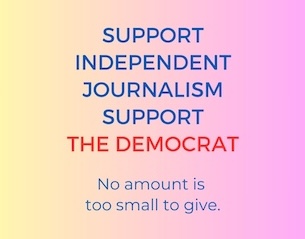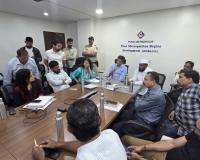- India
- Delhi Elections: Rare Spectre of Favourite Incumbents
Delhi Elections: Rare Spectre of Favourite Incumbents
The incumbent, Aam Aadmi Party (AAP), is asking for votes in the name of the free water and power given to every family up to a certain level, Wifi and CCTVs in large parts of Delhi, the developments in the schools and health infrastructure in the city-state, doorstep government services asked for online, free public
The incumbent, Aam Aadmi Party (AAP), is asking for votes in the name of the free water and power given to every family up to a certain level, Wifi and CCTVs in large parts of Delhi, the developments in the schools and health infrastructure in the city-state, doorstep government services asked for online, free public transport for women, and progress achieved in roads and bridges and doubling of the state budget.
The challenger BJP, which rules the Centre, is asking for votes in the name of the decision taken to regularise 40 lacs slum houses in unauthorized colonies. And it is questioning the AAP government on the spread, quality and quantity of the developmental work it is claiming. For BJP, a Delhi defeat will not make any material difference to its power, but the capital electoral battle seems to have become one royal one being the first one after the movement kicked off on CAA-NRC-NPR issues and it is one of prestige of Modi-Shah duo ruling roost in the party and the government today. Also a victorious Kejriwal in Delhi may use this success and his much touted Delhi-model of governance to spread wings in other states after the polls.
The distant third contender, Congress, which is giving a comic relief, is trying to prove that AAP has been working on most of the development measures only in the last six months. Interestingly, it does not have much to speak for BJP which is ruling the MCDs of Delhi for 15 years, and at the Centre for close to 6 years now. It is obvious from the ongoing campaign that Congress is more pained at its vote-base being taken away by AAP rather than the political challenges posed by the BJP.
While the largely women protesters keep up their peaceful relentless protests at Shaheen Bagh for more than a month now in biting cold, and students in Jamia and JNU get beaten and videos circulate across all social media of the same, the AAP leadership has maintained studied distance from all of these, while BJP and a section of the media are desperately trying to drag them into the debate to overtly give a communal angle to the polls. Kejriwal has maintained that AAP has votes against CAA in the Parliament and the need of the day is not CAA-NRC but to take collective measures against joblessness which is at a half century high and ensure economic growth which is at its least in more than decade now.
So far the election in Delhi is refusing to turn communal hence.
The bringing in of Pakistan and communal talk by a desperate BJP candidate and AAP turncoat Kapil Mishra has led to he being ordered by the Election Commission to refrain from campaigning for two days and Delhi Police asked to file an FIR against him. So, the mood is clear.
It is indeed a battle royal with AAP putting all its might and with a couple of hundred leading volunteers of other states coming in to put their might too, and there is a plethora of song and dance, street-plays and social media memes supporting the campaign. On the other hand, some 5000 small meetings across 21 days have been embarked upon by BJP with 30 of its top leaders including the PM, the Home Minister and central ministers addressing these meets (PM has confirmed so far only 4 large meetings till February 6, when the campaign comes to an end, with elections on February 8 and results on February 11. Congress, on its part, is valiantly visible only on social media with the feeling on ground being on of having given up the fight.
Delhi has 70 seats, for which AAP has given candidates in all seats, with 15 sitting MLAs being replaced by fresh faces, and two of them first turned rebel independents and then withdrew, and two others have become Congress candidates (Adarsh Shastry and Alka Lamba) and one is contesting as a BJP candidate (Kapil Mishra).
BJP is contesting in 67 seats, with 2 given to JD(U) and 1 given to LJSP of Paswan, while miffed Akalis have opted out of contest with seats given to them below their expectations. There are six women candidates in BJP list (as against 8 in AAP list).
Congress also contests in 67 seats, with three given to RJD, its Bihar ally.
In the 2015 Assembly poll, 143 candidates from the AAP, BJP and the Congress had assets worth Rs 1 crore or more. This time, the number of such candidates has swelled to 164, which is a nearly 11 per cent increase. Also, 13 candidates have declared assets worth over Rs 50 crore — the Aam Aadmi Party (AAP) has six, Congress has four and the Bharatiya Janata Party (BJP) three.
In 2015, the average age of the AAP candidates was 43.1 years, but it has now increased to 47.3. For the BJP, there is a marginal change in the average age of the contesting candidates, from 51.7 in 2015 it has shot up to 52.8. In contrast, the Congress party has registered a decline in fielding older candidates. From 53.3, the average age has come down to 51.2 years. Twenty candidates below the age of 40 are contesting from the AAP; for the Congress it is 12, and the BJP has merely 6 candidates. AAP decidedly has an edge in age of its candidates.
The two crores electorate of Delhi has been an unpredictable lot. After giving three consecutive terms to Sheila Dixit of Congress, it gave a hung assembly in 2013 as AAP rose from the vestiges of the Anna led movement named India Against Corruption. It was followed by one clean sweep of 67-03 to AAP in 2015, but interestingly a similar clean sweep of 7-0 in two back to back national elections to BJP in 2014 and 2015, apart from making BJP the winner in the three Municipal Corporations with AAP a distant second.
Thus it is clear that the voters completely differentiate between central and local elections in Delhi and they have Modi and Kejriwal as their heroes for two different purposes. The same trend is expected to continue this time too with all opinion polls indicating a clean sweep for AAP this time around also in the state polls.
Many observers feel that AAP needs to win also to prove that good governance can win elections, to underscore the critical sentiments of the people in the aftermath of CAA-NRC debate, to keep a semblance of political competition in the polity at the centre, and to keep a functional democracy alive and strengthened. February 11 will answer that.
However, it is clear that a victorious AAP may next focus on national expansion again and may decide to keep Manish Sisodia focused on Delhi while Kejriwal goes national. A defeated BJP will shrug it off as an aberration and would rather focus on Bihar and Bengal polls coming next which are electorally more important for BJP. A win for BJP will spell the doom of AAP and underscore the support that Modi enjoys as the elections are being fought with the faces of Kejriwal and Modi at the forefront. Congress either way loses.













